
In this article I would like to go over the benefits of protecting your hearing as a drummer. A drum set produces very harsh frequencies for your ears and the ears of anyone else around the drum set while it’s being played. This article will give you reasons to use ear protection and suggested ear protection tools to use.
So let’s face it… drums are loud.
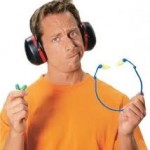 I know it is probably no surprise to you since it’s a phrase that is often assumed. But nevertheless, it is an important fact to keep in mind since your hearing is definitely affected by it. Whether you are a drummer that plays for fun or performs on stage seven days a week, it is important to protect your ears.
I know it is probably no surprise to you since it’s a phrase that is often assumed. But nevertheless, it is an important fact to keep in mind since your hearing is definitely affected by it. Whether you are a drummer that plays for fun or performs on stage seven days a week, it is important to protect your ears.
One of the most common forms of hearing damage that musicians face is tinnitus. Tinnitus is usually recognized as a constant ringing in your ears, even when there is no external sound around you. Besides being very annoying, it is a sign of hearing damage.
In some cases ringing in your ears may be temporary, like if you are exposed to loud noises and your ears ring for a couple days after the noises have stopped. A warning though, even if the ringing does eventually stop, hearing damage is something that does not repair itself over time. Once your hearing has been damaged, it will remain that way. For drummers, this is a problem that sometimes won’t be discovered until many years after they have been playing without ear protection.
I don’t know about you, but that scares me. I look forward to playing music for a long time and the last thing I want to do is lose my hearing playing drums. Hopefully now you are interested in taking steps to protect your ears when you play the drums.
The two most common and obvious ways to prevent tinnitus and other forms of hearing damage are earplugs and isolation headphones. Fortunately, both of these options come in a variety of prices and styles.
 The first and most affordable options are foam earplugs. Foam earplugs are not only the most affordable option (usually just a couple dollars for a pair), but also the most available. These earplugs can be found at a variety of stores all over the place and will mold to fit most ear canals. Foam Earplugs are also very effective; canceling out a good amount of exterior sound. Unfortunately for drummers, the foam earplugs may be a little too effective. Drums often sound muffled through these earplugs, which will upset most players.
The first and most affordable options are foam earplugs. Foam earplugs are not only the most affordable option (usually just a couple dollars for a pair), but also the most available. These earplugs can be found at a variety of stores all over the place and will mold to fit most ear canals. Foam Earplugs are also very effective; canceling out a good amount of exterior sound. Unfortunately for drummers, the foam earplugs may be a little too effective. Drums often sound muffled through these earplugs, which will upset most players.
![]() Other low cost options for earplugs are moldable silicone earplugs. Like the foam earplugs, the cost is only a few dollars and will provide comfort since they will mold to a drummers’ ears. Also they don’t have quite as high of a noise reduction rating as the foam earplugs, which means the drums may not sound as muffled. The only drawback I have found with the silicone earplugs is they might stick to hair. Typically when the gig is warm inside too, the silicone can warm up and be a little messy.
Other low cost options for earplugs are moldable silicone earplugs. Like the foam earplugs, the cost is only a few dollars and will provide comfort since they will mold to a drummers’ ears. Also they don’t have quite as high of a noise reduction rating as the foam earplugs, which means the drums may not sound as muffled. The only drawback I have found with the silicone earplugs is they might stick to hair. Typically when the gig is warm inside too, the silicone can warm up and be a little messy.
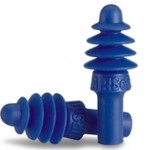 Plastic, ringed earplugs are another option usually available. They may be everywhere, but I do not recommend these for any drummer. Not only are they not comfortable, but there noise reduction rating is low as well. They are also priced higher than the foam and moldable earplugs. I suggest avoiding these if you can.
Plastic, ringed earplugs are another option usually available. They may be everywhere, but I do not recommend these for any drummer. Not only are they not comfortable, but there noise reduction rating is low as well. They are also priced higher than the foam and moldable earplugs. I suggest avoiding these if you can.
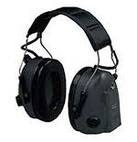 Gun muffs are good options for drumming headphones. There is a chance you may already have a pair laying around already, but if not they are very cost effective (anywhere between $20 and $30). I recommend these for practicing drums, as they won’t be as effective in the studio or on stage. Gun muffs usually come in a range of noise reduction rates so I encourage you to find the pair that fits best for you.
Gun muffs are good options for drumming headphones. There is a chance you may already have a pair laying around already, but if not they are very cost effective (anywhere between $20 and $30). I recommend these for practicing drums, as they won’t be as effective in the studio or on stage. Gun muffs usually come in a range of noise reduction rates so I encourage you to find the pair that fits best for you.
The next three options for hearing protection will jump in price substantially. Now I would like to focus on options for professional musicians or anyone interested in using the same quality for their drumming.
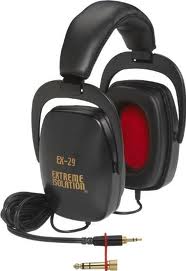 Stereo isolation headphones are very common in recording studios all over the world. They will not only isolate the sound in your ear, but also have built in speakers to listen to music and voices of anyone else in the studio. Most of these headphones are available anywhere between $50-$100 and will probably be found at retail music stores. These are most common in the studio due to their size. It is not convenient to play with them on stage and is a bit of an eyesore. In the recording studio, or when practicing, your “look” may not be as important to you as when you are performing. For recording purposes then, these headphones are ideal.
Stereo isolation headphones are very common in recording studios all over the world. They will not only isolate the sound in your ear, but also have built in speakers to listen to music and voices of anyone else in the studio. Most of these headphones are available anywhere between $50-$100 and will probably be found at retail music stores. These are most common in the studio due to their size. It is not convenient to play with them on stage and is a bit of an eyesore. In the recording studio, or when practicing, your “look” may not be as important to you as when you are performing. For recording purposes then, these headphones are ideal.
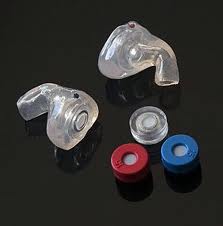 Popular choices for professional musicians are custom musician earplugs. The two largest benefits of these earplugs versus other options are that they are custom built to fit the drummer’s ears and have extremely clear sound due to a specific noise reduction rating. Often times, they can be built to cut out most harmful sound frequencies, but let through those needed to play music with. These can be priced differently depending on where they are purchased, but will typically be closer to $200.
Popular choices for professional musicians are custom musician earplugs. The two largest benefits of these earplugs versus other options are that they are custom built to fit the drummer’s ears and have extremely clear sound due to a specific noise reduction rating. Often times, they can be built to cut out most harmful sound frequencies, but let through those needed to play music with. These can be priced differently depending on where they are purchased, but will typically be closer to $200.
 The most popular and effective hearing options for professional drummers that perform live are in-ear monitors. In-ear monitors offer a drummer the option to choose how much volume comes through the monitors. This option is excellent for live performances since it also eliminates the need for stage monitors. Decreasing the amount of overall stage volume for a band will help substantially for everyone involved in the performance.
The most popular and effective hearing options for professional drummers that perform live are in-ear monitors. In-ear monitors offer a drummer the option to choose how much volume comes through the monitors. This option is excellent for live performances since it also eliminates the need for stage monitors. Decreasing the amount of overall stage volume for a band will help substantially for everyone involved in the performance.
This information should give you a great start to finding the right option to protect your hearing. Remember that once you lose it there isn’t much you can do to bring it back. Be smart and take the initiative to protect your hearing now.
Chris
Leave A Reply (11 comments so far)
Gail
Great to hear, one has several options…
Wally
I’ve used the ringed earplug w/o any issues. I tried the foam and the moldeble ones but really didn’t like them. Great article though.
Thanks
Wally
http://4drummersonly.wordpress.com
Chris
It is definitely a matter of personal preference on this one. I have tried most of these and I usually go with the foam ones because they are quick and easy.
Alan
Hi Chris
Glad to see an article about hearing protection. I have recently begun to play again…. Thanks for the help… but I have a dilema… I suffer from hearing loss (mostly industrial related), to the point that for the past ten years or so I have needed to wear hearing aids to understand normal conversation in a quiet situation. Usuallly when I play drums I just ‘unplug’, it works pretty good at reducing the harshness of the drums and ‘screaming vocals’, but when it comes to softer sections I really struggle to hear the changes and kind of run on instinct, also not good for communication, ….so far so good but it makes me nervous! I have played with my ‘ears on’, but after a short while it becomes overwhelming, the hearing aids are digital and of high quality and offer too much sound for any extended period but are essential for communicating with the band. I’m reluctant to wear ‘earplugs’, even ‘in ear monitor’ types……….. any suggestions besides lip reading and sign language???…. I’m already pretty good at both.
Thanks
Alan
Chris
Hey there Alan,
Well… I generally love in ears because is isolates the music and drastically cut back on the ambient noise. Also, you get a bit of control with at the very least a volume knob. In your case I have heard of guys leaving the hearing aids on and using the “Gun Muff” type of head phones. When it gets to a quiet section you can simply pull one or both of the muffs off and slide them an inch or two behind or in front of your ear. This way they are still on your head and close to your ears, if the quiet section is only a few bars you can quickly reach up in between notes and slide them back into place for the loud section again.
This allows you to get the best of both worlds. Give it a try and let me know how it works for you!
dave
GREAT IDEAS ,THANK,DAVE PROTECT THE EARS I LOVE IT!
Steven
Etemotic ear plugs work great!
Micah
I have a cool little setup: I have Traps drums that you can fold up and move really easy. I play drums right in front of my computer, and play the music coming through the HP headphones. They do a great job of blocking unnecessary sound and at the same time I can crank up the tunes if I want. I don’t struggle at all on soft parts and I rarely get my ears ringing on heavy songs. If you can do anything similar, I suggest you do. Normal headphones (though not the cheap $6 kind) work well at simply reflecting all the super-loud sounds away.
Jazzman
Thanks for all the helpful suggestions.
james hand
Hello i use the Stereo isolation headphones so i can hear music. I also wear a little ear phone under them in my ear hooked up to my metronome.I really am enjoying your course. I have only been playing for a few weeks now.I could never been as far as i am with out your Chris.I bought the TAMA Rhythm watch rw105 for about $ 90.00 Is this a decent one?
Thank Chris
Chris
Yes James that is a great one. I am currently using that one as well.